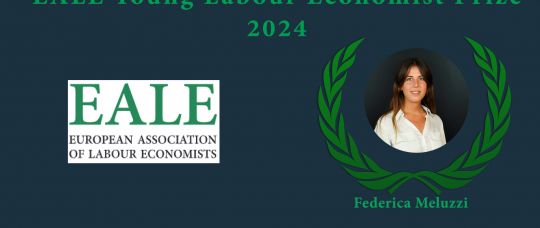CREST is proud to announce that Federica Meluzzi, a PhD candidate in Economics at CREST-GENES, has been awarded the 2024 EALE Young Labor Economist Prize.
Federica Meluzzi, PhD candidate at CREST specialized in labor economics.

Federica’s work is in labor economics at the intersection with public economics and education. Specifically, her research is on gender differences in the labor market, with a focus on how gender norms are transformed, either by public policies or with the social environment.
Federica will be going on the academic job market 2024 – 2025.
The European Association of Labor Economists and the EALE Young Labor Economist Prize.
The European Association of Labor Economists (EALE) was founded in 1989 in order to promote the advancement of knowledge in the field of labor economics in Europe and elsewhere.
The EALE Young Labor Economist Prize is awarded by the EALE to recognize outstanding research in labor economics. It is awarded to a young economist, who has authored an excellent paper presented at the annuel EALE conference. The prize aims to highlight innovative contributions to the field and support the development of young researchers in labor economics. It is considered a prestigious honor within the academic community.
For the 2024 EALE Conference, Federica presented her paper “The College Melting Pot: Peers, Culture and Women’s Job Search”.

“The College Melting Pot: Peers, Culture and Women’s Job Search”.
Today, there is strong consensus on the importance of gender norms in explaining the residual gender gaps in the labor market. However, our understanding of the drivers of gender norms, and their implications for preferences, remain lacking. Her paper, “The College Melting Pot: Peers, Culture and Women’s Job Search”, contributes to filling this gap by providing novel large-scale evidence on the effects of the social environment – specifically college classmates – as a driver of women’s early-career labor market decisions.
Using unique administrative and survey data covering all college students in Italy, this study leverages cross-cohort idiosyncratic variation in the geographical origins of peers within Master’s programs. The key finding is tat exposure to female classmates from areas with egalitarian gender norms significantly increases women’s labor supply, primarily through increased uptake of full-time jobs. The estimated peer effects are substantial, accounting for more than a third of the gender earnings gap.
Drawing on large-scale data on students’ job-search preferences and newly collected data on their beliefs, Federica shed light two main drivers of peer influence: (i) shifts in preferences for non-pecuniary job attributes, and (ii) social learning, particularly on the characteristics of the job offer distribution.
Other works.
Federica’s other works are on how the design of parental leave benefits affects households’ decisions to share parental leave, on the role of firlms in shaping the stickiness of gender norms, on the effects of pay transparency on within-firm pay premia, and on gender differences in the responsiveness to UI benefits.

